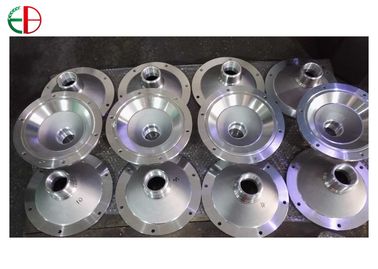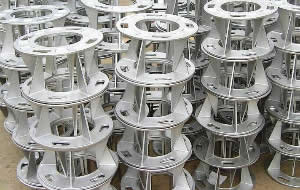Aluminum Foundry solutions designed for excellence in production
Checking out the Role of Foundry Solutions beforehand Modern Engineering Solutions
Shop services are necessary in shaping modern engineering options - Precision aluminum casting. They connect the space between typical manufacturing techniques and the demands of contemporary industries. With innovations in automation and sustainability, shops are developing to satisfy the requirements of industries such as aerospace and automobile. This transformation raises concerns regarding the effects for materials, processes, and future developments. What chances and obstacles exist in advance for shop solutions in this swiftly changing landscape?
The Advancement of Foundry Services in Engineering

The combination of computer-aided layout (CAD) and simulation software application has actually reinvented the design and manufacturing procedures, enabling factories to produce complex geometries with higher precision. Furthermore, the shift towards environment-friendly techniques has caused the adoption of greener technologies and reusing initiatives within shops. As industries significantly prioritize modification and fast prototyping, factory solutions have actually increased their abilities, ensuring they stay crucial contributors to the engineering landscape. This development highlights the factory's crucial function in sustaining improvements throughout different sectors, including automotive, aerospace, and power.
Secret Processes and Strategies in Modern Foundries
Modern shops use a selection of essential processes and techniques that enhance the efficiency and high quality of steel spreading. Among these, sand casting remains common because of its convenience and cost-effectiveness. Using innovative modern technologies, such as computer-aided design (CAD) and computer-aided manufacturing (WEBCAM), permits for exact modeling and production, making certain high accuracy in part dimensions. Additionally, investment casting is preferred for producing complex geometries with outstanding surface coatings.
In addition, automation and robotics boost manufacturing rate and consistency while decreasing labor costs. Techniques like additive production are increasingly integrated to create elaborate mold and mildews and cores, thereby decreasing product waste. The application of thermal evaluation aids in optimizing spreading processes by anticipating and regulating solidification actions. Jointly, these techniques and processes exhibit how contemporary foundries are adjusting to satisfy the demands of modern design challenges, making certain remarkable product high quality and operational effectiveness.
The Significance of Materials Choice in Foundry Providers
Selecting the proper products is important in shop services, as it directly influences the mechanical residential properties, toughness, and total efficiency of the end product. Various materials possess special features, such as tensile stamina, deterioration resistance, and thermal stability, which should line up with the desired application of the cast elements. Steels like light weight aluminum and steel are typically selected for their strength-to-weight proportion, while alloys can improve details performance characteristics.
Additionally, the selection process involves considering factors such as cost, manufacturability, and availability, which can significantly affect project timelines and spending plans. In addition, developments in material scientific research allow the advancement of ingenious composites and specialized alloys that provide to emerging engineering obstacles. A complete understanding of product residential properties and their ramifications is vital for designers and factory professionals to attain effective end results in their projects. This cautious selection process eventually boosts the reliability and effectiveness of the end products.
Factory Solutions in Aerospace and Automotive Applications
Shop services play a vital duty in the aerospace and auto markets, where accuracy and performance are paramount. These industries depend greatly on the production of complicated elements that have to meet strenuous quality requirements and endure severe problems. Factories offer critical services such as casting, machining, and ending up, making sure parts are light-weight yet durable, essential for boosting gas performance and safety and security.
In aerospace, shop services add to the production of turbine blades, engine elements, and architectural parts, every one of which demand elaborate layouts and high-performance materials. Likewise, in the auto field, factories provide engine blocks, framework components, and transmission situations, concentrating on resilience and weight reduction.
Advanced shop methods, including additive manufacturing and precision spreading, are significantly used to fulfill the specific requirements of these industries. By offering tailored services, factory solutions aid drive advancement and keep affordable advantages in the fast-evolving aerospace and vehicle landscapes.
Innovations Driven by Shop Capabilities
Countless developments in design are sustained by the sophisticated capabilities of foundry services. These services make it possible for the manufacturing of complicated geometries and high-performance materials that are necessary for modern-day applications. Additive manufacturing, typically known as 3D printing, has seen substantial improvements through foundry strategies, allowing for the fast prototyping of detailed designs. In addition, the capability to cast lightweight alloys has actually reinvented sectors such as aerospace and automotive, leading to boosted fuel effectiveness and performance.
Foundries are significantly incorporating clever innovations, such as automation and data analytics, to improve production effectiveness and quality control. These innovations not just lower waste but likewise allow personalization at range, satisfying the certain demands of clients. By leveraging innovative foundry abilities, designers can discover brand-new frontiers in item design and performance, eventually driving progression throughout numerous sectors and establishing a structure for future improvements.
Future Trends in Foundry Solutions and Engineering Solutions
The future of factory solutions is formed by arising trends such as lasting manufacturing techniques, which focus on environmental obligation. Automation and smart technologies are readied to enhance efficiency and accuracy, while raising personalization and adaptability will meet the developing demands of clients. As these trends advance, they will redefine the landscape of design options in the factory sector.
Lasting Production Practices
As markets significantly prioritize environmental responsibility, lasting production methods within factory services are becoming crucial to modern-day design options. These methods concentrate on reducing waste, reducing energy consumption, and making use of eco-friendly products throughout the production procedure. By executing strategies such as recycling scrap steel and optimizing melting procedures, factories can especially lower their carbon impact. Furthermore, the fostering of life cycle analyses allows suppliers to evaluate the environmental influence of their products from inception to disposal. Teaming up with distributors committed to sustainability additionally enhances the performance of these initiatives. Ultimately, welcoming lasting production not only lines up with see this site international environmental goals but additionally promotes advancement and competitiveness in the quickly developing design landscape.
Automation and Smart Technologies
While numerous industries are embracing technical innovations, foundry solutions are experiencing a significant change via automation and wise modern technologies. The integration of robotics and automated systems boosts production performance, decreases human mistake, and increases the manufacturing process. Smart modern technologies, such as IoT and AI, allow real-time surveillance and anticipating maintenance, which enhance functional performance and minimize downtime. These developments help with data-driven decision-making, enabling foundries to respond swiftly to market demands and enhance product quality. Furthermore, automation minimizes labor costs and boosts workplace safety and security by managing unsafe tasks. As foundry solutions remain to embrace these technologies, they are poised to redefine engineering options, bring about increased competitiveness and sustainability in the production market.
Personalization and Adaptability Fads
Arising fads in factory services progressively highlight customization and adaptability to satisfy special consumer demands. This change Look At This reflects a broader demand for customized engineering services that adapt to details job needs and sector standards. Business are buying sophisticated modern technologies, such as additive production and digital modeling, enabling them to produce customized parts successfully and cost-effectively. Because of this, factories are moving away from one-size-fits-all methods, providing clients the ability to change styles and products in real-time. Additionally, collaboration in between engineering groups and foundry solutions is ending up being much more incorporated, fostering development and accelerating time-to-market. This pattern not just boosts product performance yet likewise supports sustainability by reducing waste via accurate production processes.
Regularly Asked Questions
What Are the Regular Costs Connected With Foundry Providers?
Typical costs related to shop solutions include material expenditures, labor charges, equipment usage charges, and overhead costs - aluminum casting. These expenditures can differ commonly based upon job complexity, quantity, and specific demands of the engineering service entailed
For how long Does the Foundry Refine Normally Take?
The factory procedure commonly takes anywhere from several weeks to a couple of months, depending upon factors such as complexity, product requirements, and production volume, which can substantially influence timelines and overall project delivery.
What Industries Benefit A Lot Of From Shop Providers?
Industries such as automotive, aerospace, and construction benefit significantly from foundry solutions. These sectors rely on precision casting and metal manufacture to produce intricate elements, improving product efficiency and functional effectiveness in their particular applications.
What Qualifications Should Foundries Have?
Shops should possess certifications such as ISO 9001 for top quality management, ISO 14001 for environmental administration, click here for more info and certain market certifications like AS9100 for aerospace or IATF 16949 for automotive, ensuring conformity and high quality guarantee.
Just How Do Foundries Make Certain Quality Assurance in Their Procedures?

Shop services are crucial in shaping modern design remedies. As engineering techniques have actually progressed, the role of shop solutions has changed considerably to meet advancing market demands. As markets significantly focus on personalization and rapid prototyping, shop services have actually broadened their abilities, ensuring they continue to be essential contributors to the engineering landscape. As markets progressively focus on ecological responsibility, lasting manufacturing methods within foundry solutions are becoming important to modern-day engineering options. Furthermore, cooperation between design groups and foundry services is ending up being much more integrated, promoting innovation and speeding up time-to-market.